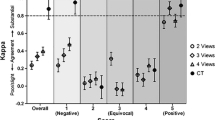Abstract
Objective
To evaluate whether MRI correlates with CT and SPECT imaging for the diagnosis of juvenile spondylolysis, and to determine whether MRI can be used as an exclusive image modality.
Design and patients
Juveniles and young adults with a history of extension low back pain were evaluated by MRI, CT and SPECT imaging. All images were reviewed blindly. Correlative analyses included CT vs MRI for morphological grading and SPECT vs MRI for functional grading. Finally, an overall grading system compared MRI vs CT and SPECT combined. Statistical analysis was performed using the kappa statistic.
Results
Seventy-two patients (mean age 16 years) were recruited. Forty pars defects were identified in 22 patients (31%), of which 25 were chronic non-union, five acute complete defects and ten acute incomplete fractures. Kappa scores demonstrated a high level of agreement for all comparative analyses. MRI vs SPECT (kappa: 0.794), MRI vs CT (kappa: 0.829) and MRI vs CT/SPECT (kappa: 0.786). The main causes of discrepancy were between MRI and SPECT for the diagnosis of stress reaction in the absence of overt fracture, and distinguishing incomplete fractures from intact pars or complete defects.
Conclusions
MRI can be used as an effective and reliable first-line image modality for diagnosis of juvenile spondylolysis. However, localised CT is recommended as a supplementary examination in selected cases as a baseline for assessment of healing and for evaluation of indeterminate cases.








Similar content being viewed by others
References
Fredrickson BE, Baker D, McHolick WJ, Yuan HA, Lubicky JP. The natural history of spondylolysis and spondylolisthesis. J Bone Joint Surg Am 1984;66(5):699–707.
Wiltse LL, Widell EH Jr, Jackson DW. Fatigue fracture: the basic lesion is isthmic spondylolisthesis. J Bone Joint Surg Am 1975;57(1):17–22.
Rosenberg NJ, Bargar WL, Friedman B. The incidence of spondylolysis and spondylolisthesis in non-ambulatory patients. Spine 1981;6:35–37.
Wiltse LL, Newman PH, Macnab I. Classification of spondylolisis and spondylolisthesis. Clin Orthop 1976 (117):23–29.
Collier BD, Johnson RP, Carrera GF, et al. Painful spondylolysis or spondylolisthesis studied by radiography and single-photon emission computed tomography. Radiology 1985;154:207–211.
Gundry CR, Fritts HM Jr. MR imaging of the spine in sports injuries. Magn Reson Imaging Clin N Am 1999;7(1):85–103.
Libson E, Bloom RA. Anteroposterior angulated view. A new radiographic technique for the evaluation of spondylolysis. Radiology 1983;149:315–316.
Libson E, Bloom RA, Dinari G, et al. Oblique lumbar spine radiographs: importance in young patients. Radiology 1984;161:98–90.
Papanicolaou N, Wilkinson RH, Emans JB, Treves S, Micheli LJ. Bone scintigraphy and radiography in young athletes with low back pain. AJR Am J Roentgenol 1985;145:1039–1044.
Pennell RG, Maurer AH, Bonakdarpour A. Stress injuries of the pars interarticularis: radiologic classification and indications for scintigraphy. AJR Am J Roentgenol 1985;145:763–766.
Grogan JP, Hemminghytt S, Williams AL, et al. Spondylolysis with computed tomography. Radiology 1982;145:763–742.
Langston JW, Gavant ML. “Incomplete ring” sign: a simple method for CT detection of spondylolysis. J Comput Assist Tomogr 1985;9:726–729.
Rothman SLG, Glenn WV. CT multiplanar reconstruction in 253 cases of lumbar spondylolysis. AJNR Am J Neuroradiol 1984;5:81–90.
Teplick JG, Laffey PA, Berman A, et al. Diagnosis and evaluation of spondylolisthesis and/or spondylolysis on axial CT. AJNR Am J Neuroradiol 1986;7:479–491.
Saifuddin A, Burnett SJ. The value of lumbar spine MRI in the assessment of the pars interarticularis. Clin Radiol 1997;52(9):666–671.
Johnson DW, Farnum GN, Latchaw RE, Erba SM. MR imaging of the pars interarticularis. AJR Am J Roentgenol 1989;152(2):327–332.
Campbell RS, Grainger AJ. Optimization of MRI pulse sequences to visualize the normal pars interarticularis. Clin Radiol 1999;54(1):63–68.
Ulmer JL, Elster AD, Mathews VP, Allen AM. Lumbar spondylolysis: reactive marrow changes seen in adjacent pedicles on MR images. AJR Am J Roentgenol 1995;164(2):429–433.
Udeshi UL, Reeves D. Routine thin slice MRI effectively demonstrates the lumbar pars interarticularis. Clin Radiol 1999;54(9):615–619.
Hollenberg GM, Beattie PF, Meyers SP, Weinberg EP, Adams MJ. Stress reactions of the lumbar pars interarticularis: the development of a new MRI classification system. Spine 2002;27(2):181–186.
Altman DG. Practical statistics for medical research. In: London: Chapman and Hall; 1991. p. 403–409.
Beutler WJ, Fredrickson BE, Murtland A, Sweeney CA, Grant WD, Baker D. The natural history of spondylolysis and spondylolisthesis: 45-year follow-up evaluation. Spine 2003;28(10):1027–1035; discussion 1035.
Grenier N, Kressel HY, Schiebler ML, Grossman RI. Isthmic spondylolysis of the lumbar spine: MR imaging at 1.5 T. Radiology 1989;170(2):489–493.
Heitoff KB, Gundry CR, Burton CV, et al. Juvenile discogenic disease. Spine 1994;19:335–340.
Jensen MC, Brant-Zawadzki MN, Obuchowski N, Modic MT, Malkasian D, Ross JS. Magnetic resonance imaging of the lumbar spine in people without back pain. N Engl J Med 1994;331(2):69–73.
Micheli LJ, Wood R. Back pain in young athletes. Significant differences from adults in causes and patterns. Arch Pediatr Adolesc Med 1995;149(1):15–18.
Ralston S, Weir M. Suspecting lumbar spondylolysis in adolescent low back pain. Clin Pediatr (Phila) 1998;37(5):287–293.
Watkins RG, Dillin WH. Lumbar spine injury in the athlete. Clin Sports Med 1990;9:419–448.
Steiner ME, Micheli LJ. Treatment of symptomatic spondylolysis and spondylolisthesis with the modified Boston brace. Spine 1985;10:937–943.
Blanda J, Bethem D, Moats W, Lew M. Defects of the pars interarticularis in athletes: a protocol for non-operative treatment. J Spinal Disord 1993;6:406–411.
Wiltse LL. The effect of the common anomalies of the lumbar spine upon disk degeneration and low back pain. Orthop Clin North Am 1971;2:569–582.
Rauch RA, Jinkins JR. Lumbosacral spondylolisthesis associated with spondylolysis. Neuroimaging Clin N Am 1993;3:543–555.
Matheson GO, Clement DB, McKenzie DC, Taunton JE, Lloyd-Smith DR, Macintyre JG. Scintigraphic uptake of 99mTc at non-painful sites in athletes with stress fractures: the concept of bone strain. Sports Med 1987;4:65–75.
Acknowledgements
The authors would like to gratefully thank all the radiography staff in MRI and CT and the technicians in nuclear medicine for their enduring support during this study. Many thanks
Author information
Authors and Affiliations
Corresponding author
Rights and permissions
About this article
Cite this article
Campbell, R.S.D., Grainger, A.J., Hide, I.G. et al. Juvenile spondylolysis: a comparative analysis of CT, SPECT and MRI. Skeletal Radiol 34, 63–73 (2005). https://doi.org/10.1007/s00256-004-0878-3
Received:
Revised:
Accepted:
Published:
Issue Date:
DOI: https://doi.org/10.1007/s00256-004-0878-3




